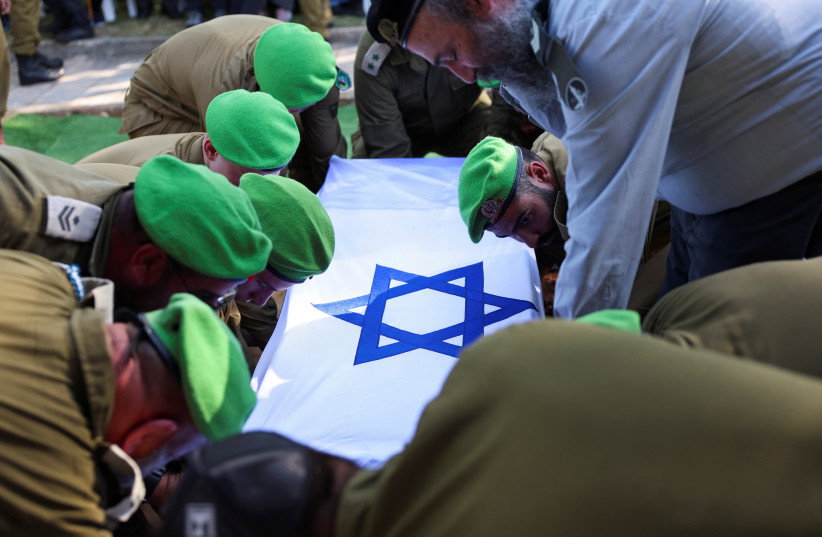We in Israel have seen too many of our young people buried well before their time, albeit all in the service of our country, as they defended the rest of us against those who seek to destroy us.
By now, we know the drill. The deceased, inside a casket – a plain pine box, according to Jewish tradition, and covered with the flag of the State and People of Israel – is carried to his or her final resting place on the shoulders of those with whom the departed had fought the enemy.
The casket is set in its place, the flag is removed, the body is lowered into the grave, and friends and family empty earth-filled bags until the grave is fully covered, after which the burial service begins.
Many of these burials are live-streamed, and I believe I have watched almost all of them. They are generally emotional, moving experiences, with the faces of the mourners reflecting the pain they feel over the unexpected loss of a son or daughter, a father or mother, a brother or sister, a grandchild, or just a good friend.
We do all of this well, with the proper honor given to each of those who made the ultimate sacrifice in defense of our country.

Yet there is always one piece of the ritual that, in my view, is not very respectful. At each of these funerals, a member of the IDF stands in the background cradling a clump (sadly, that’s the best word to describe it) of white cloth with blue stripes and a Star of David. That clump of cloth is the flag of the State and People of Israel for which, symbolically, the deceased sacrificed his or her life. When it is removed from the casket, the clump of cloth that is our flag is handed to a member of the IDF, who then moves to the side. That flag – our flag – deserves more respect.
Have you ever watched a military funeral in the United States, Canada, or England? They are all similar, but I will use the US as an example, as it is also an army in which I served many years ago.
The flag is lifted with love and care by (usually) six members of the military who are properly dressed for the occasion. They pull the flag tied between them and then go through a relatively complicated, but carefully prescribed, series of folds to end up with a flag folded in the shape of a triangle with the white stars on a blue background fully visible and nary a piece of material out of place.
The detail in charge of this ritual then presents the flag to an officer, salutes, and walks toward the grieving family. The officer bends down on one knee and hands the folded flag to the family, expressing gratitude on behalf of the nation and the US Army for their loved one’s honorable and faithful service.
It is always an emotional moment as the next of kin accepts the flag from a representative of the government, while the family receives, as a keepsake, the very flag that covered their loved one’s casket and for which he or she made the ultimate sacrifice.
I am aware, of course, that the IDF is not nearly as formal as other Western militaries. We have often looked at our senior officers when they have gone abroad in their dressy uniforms and thought to ourselves, “They look so out of place in that formal setting; the uniforms don’t even seem to fit properly.”
Am Yisrael Chai
Nevertheless, we Israelis need to remember that regardless of our informality, our losses are no less traumatic and our flag no less symbolic.
We need to show our young people that our flag is not merely a clump of material, but the very representation of 3,700 years of Jewish history during which millions of our ancestors gave their lives in pursuit of the right to fly it in their own country. The flag has earned our respect, and those who have gone before us would be proud if we properly recognized that.
Hopefully, one of the positive outcomes of this war, in which so many of our best have given their lives, will be a new respect for this public symbol of Israel and the Jewish people for which we have paid such a high price.
Sherwin Pomerantz has lived in Israel for 40 years. He is the founder and chair of Atid EDI Ltd., an international business development consultancy, as well as the American State Offices Association. He is also the former national president of the Association of Americans and Canadians in Israel and a past board chairperson of the Pardes Institute of Jewish Studies.
